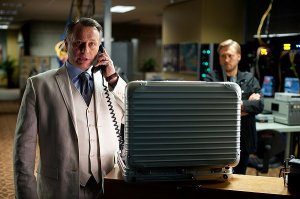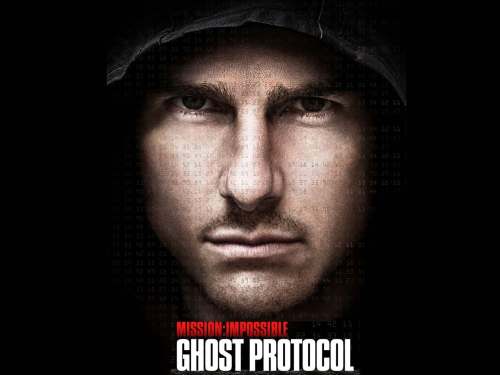Star Rating: 3.5/5
The accomplishments of Ethan Hunt, America’s most implausible secret agent, throughout the Mission: Impossible franchise, have been nothing short of incredible (in the true sense of the word). Whether it is dodging bullets and explosions; going down elevator shafts; removing countless different face-masks; procuring files from encrypted computer systems; or tracking down his enemies across the world and killing them, Ethan has never let his country down. In entertaining fashion, Mission: Impossible IV – Ghost Protocol is more of the same, just with the latest technological gadgets.

The villian, ‘Cobalt’ (Michael Nyqvist), talking on the phone to execute his orders to launch a missile.
After a failed mission in Budapest to get hold of Russian nuclear missile codes, the Impossible Missions Force (IMF) Secretary (Tom Wilkinson – Shakespeare In Love, The Debt, Denial) launches the mission ‘Ghost Protocol’ and sends Ethan Hunt (Tom Cruise – Mission Impossible I-III, Valkyrie, One Shot) into the field with a team, consisting of Benji (Simon Pegg – Mission Impossible III, Paul, Star Trek I & II), Jane (Paula Patton – Déjà Vu, Precious, Disconnect) and Brandt (Jeremy Renner – S.W.A.T., The Hurt Locker, The Avengers Assemble). The IMF needs to find an agent known by the codename ‘Cobalt’ (Michael Nyqvist – Arn: The Knight Templar, The Girl With The Dragon Tattoo, Disconnect), who has apparently got access to the codes, and stop him from launching nuclear war.
In the meantime, the Kremlin is threatened by a bomb attack and believes that the Americans are behind it. Thus, Ethan and his team, in a mission that will take them to many countries, must go rogue if they are to succeed.
The storyline for Ghost Protocol is quite simple at its core. It undoubtedly lacks the realism of Munich and The Debt (and even makes James Bond films appear plausible). Nevertheless, director Brad Bird (The Incredibles, Ratatouille, 1906) gives one what he/she would want to see in a film like Ghost Protocol, such as plenty of explosions (although nowhere near as many as in the colossal Transformers III), and stunts that are so ludicrous one needs a sack of salt to believe what he/she is watching (for a pinch of the stuff would not be enough).

If he’s not jumping down an a shoot, Ethan (Tom Cruise) is climbing the tallest skyscraper in Dubai.
Yet, as has been typical with the Mission: Impossible series, Ghost Protocol’s plot has a convoluted nature that differentiates this franchise from the Bond films and the Bourne series. Consequently, Ghost Protocol may not be so easy to follow. Whilst audiences are likely to realise that Ethan and his team are hunting ‘Cobalt’, the various other characters that flow in and out of the movie, as well as the subplots, complicate the storyline unnecessarily.
Moreover, the film’s plot is not aided by the dialogue. Viewers with a brain would be advised not to scrutinise the conversations held by the characters. Rarely do the discussions make sense to the extent that it’s remarkable that the protagonists can even contribute to their conversations. (That they understand their instructions is nothing short of miraculous!)
At least none of the actors take their roles overly seriously; if they had done, their performances would have been as pitiful as those in Fantastic Four I & II and in Captain America. However, since there is little pretence on behalf of the protagonists of the ludicrous nature of the film, all of the actors give decent and humorous, if unmemorable, displays: Tom Cruise plays (probably himself) with the same arrogance and ingenuity that he is so accustomed to playing; Simon Pegg makes his usual goofy jokes, and is the same IT-wizard of Mission: Impossible III; Jeremy Renner reprises the skills he learned in S.W.A.T., without adding much more to the movie; and Paula Patton looks good and has a surprisingly large role (especially considering that the Mission: Impossible franchise has been dominated by Cruise showing the world that he is the latest version of Action Man).
The only one who loses out is the villain played by Michael Nyqvist, since he appears so little on screen. As a corollary, Nyqvist does not get the opportunity to show audiences of his capabilities as an actor, which he illustrated so well in the Swedish adaptation of The Girl With The Dragon Tattoo and its sequels.

Ethan and Jane (Paula Patton) dressed very nicely for a lavish party. Jane is hoping to catch someone’s eye.
Lastly, the special effects and the technical gadgets used throughout Ghost Protocol are outstanding. The effects may not look as spectacular as in Harry Potter VII: Part II, but they are certainly convincing. Similarly, the gadgets are fully up-to-date and employed as impressively as when Ethan used the then-new tool, called the internet, in Mission: Impossible I. (Oh how far we have advanced!)
Over-all, Ghost Protocol gives (Tom Cruise as) Ethan Hunt another chance to achieve the unachievable and save America (and the world) from catastrophe. The film throws in more explosions, impractical objectives and improbable scenarios, as well as the latest technology, to a franchise that has always made for senseless and outrageously far-fetched, but enjoyable viewing.
PG’s Tips









